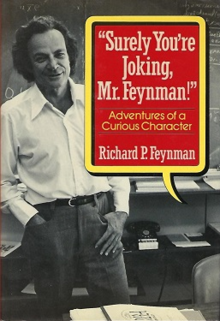"Surely You're Joking, Mr. Feynman!": Adventures of a Curious Character is an edited collection of reminiscences by the Nobel Prize–winning physicist Richard Feynman. The book, published in 1985, covers a variety of instances in Feynman's life. The anecdotes in the book are based on recorded audio conversations that Feynman had with his close friend and drumming partner Ralph Leighton.
 First edition | |
| Author | Ralph Leighton and Richard Feynman |
|---|---|
| Language | English |
| Subject | Physics |
| Genre | Autobiography, Biography, Non-fiction |
| Publisher | W.W. Norton (US) |
Publication date | 1985 (US) |
| Publication place | United States |
| Media type | Print (Hardcover & Paperback) also Audio book |
| Pages | 350 p. (US hardcover edition) & 322 p. (US paperback edition) |
| ISBN | 0-393-01921-7 (US hardcover edition) |
| OCLC | 10925248 |
| 530/.092/4 B 19 | |
| LC Class | QC16.F49 A37 1985 |
| Followed by | What Do You Care What Other People Think? |
Summary
editThe book has many stories which are lighthearted in tone, such as his fascination with safe-cracking, studying various languages, participating with groups of people who share different interests (such as biology or philosophy), and ventures into art and samba music.
Other stories cover more serious material, including his work on the Manhattan Project (during which his first wife, Arline, died of tuberculosis) and his critique of the science education system in Brazil. The section "Monster Minds" describes his slightly nervous presentation of his graduate work on the Wheeler–Feynman absorber theory in front of Albert Einstein, Wolfgang Pauli, Henry Norris Russell, John von Neumann, and other major scientists of the time.
The anecdotes were edited from taped conversations that Feynman had with his close friend and drumming partner Ralph Leighton. Its surprise success led to a sequel, What Do You Care What Other People Think?, also taken from Leighton's taped conversations. Surely You're Joking, Mr. Feynman! became a national bestseller.[1]
The book's title is taken from a comment made by a woman at Princeton University after Feynman asked for both cream and lemon in his tea, not being familiar with the proper etiquette.[2]
The final chapter, "Cargo Cult Science," was adapted from Feynman's 1974 commencement address at the California Institute of Technology,[3] in which he cautioned graduates not to minimize the weaknesses of their research in the pursuit of a preferred conclusion. He drew an analogy to the cargo cult phenomenon in the South Pacific Ocean in which, as he understood it, islanders built a mock airstrip to cause airplanes loaded with imported goods to land. Similarly, he argued, adopting the appearances of scientific investigation without a self-critical attitude will fail to produce reliable results.[2]
Reception
editFeynman's "cargo cult" metaphor was used by Tomasz Witkowski in his criticism of social science and psychology in particular. In the first part of his book, Psychology Led Astray, Witkowski asks "Is Psychology a Cargo Cult Science?", pointing out that the growth in the number of psychologists world wide has been parallel with a decrease in mental health.[4]: 25 He also points to other articles applying the cargo cult metaphor to criticize social sciences.
Murray Gell-Mann was upset by Feynman's account in the book of the weak interaction work, and threatened to sue, resulting in a correction being inserted in later editions.[5]
Feynman was criticized for a chapter titled "You Just Ask Them?" where he recounts attempting to pick up a woman, insulting her after she refuses his advances.[6][7][8] Feynman states at the end of the chapter that this behavior was not typical.
Publication data
edit- Surely You're Joking, Mr. Feynman!: Adventures of a Curious Character, Richard Feynman, Ralph Leighton (contributor), Edward Hutchings (editor), 1985, W. W. Norton, ISBN 0-393-01921-7, 1997 paperback: ISBN 0-393-31604-1, 2002 Blackstone Audiobooks unabridged audio cassette: ISBN 0-7861-2218-8
Citations
edit- ^ "Overview of Surely You're Joking, Mr. Feynman!". wwnorton.com. W. W. Norton & Company. Archived from the original on 2019-11-15.
- ^ a b Feynman, Richard (1997). Surely You're Joking, Mr. Feynman!. W. W. Norton & Company. p. 60. ISBN 978-0-393-31604-9.
- ^ Feynman, Richard P. (June 1974). "Cargo Cult Science" (PDF). California Institute of Technology. Archived (PDF) from the original on 2022-10-09. Retrieved 2015-10-25.
- ^ Witkowski, Tomasz (2016). Psychology Led Astray: Cargo Cult in Science and Therapy. Universal Publishers. ISBN 978-1-62734-609-2.
- ^ Johnson, George (July 2001). "The Jaguar and the Fox". The Atlantic. Archived from the original on May 5, 2019. Retrieved July 16, 2016.
- ^ Gleick 1992, pp. 287–291, 341–345.
- ^ Urry, Meg (August 9, 2014). "Male scientists, don't harass young female colleagues". CNN.com. Archived from the original on June 15, 2021. Retrieved May 14, 2021.
- ^ McNeill, Leila (2019). "Surely You're a Creep, Mr. Feynman: On toxic moral license and the mythos of male scientific genius". The Baffler. No. 43. pp. 112–117. doi:10.2307/26564967. ISSN 1059-9789.
- Gleick, James (1992). Genius: The Life and Science of Richard Feynman. Pantheon Books. ISBN 0679747044.
External links
edit- Quotations related to Richard Feynman at Wikiquote